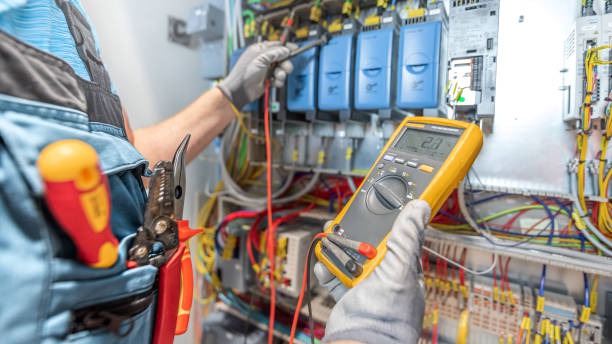Navigating electrical codes is like learning a new language. It might seem overwhelming at first, but with patience and the right guidance, it becomes second nature. These codes exist to ensure electrical work is performed safely and up to standard. Failure to comply can result in safety hazards, fines, and even legal issues. Professional electricians must keep up with these regulations to provide top-notch service.
The National Electrical Code (NEC)
The National Electrical Code (NEC) is the cornerstone of electrical safety in the United States. It’s updated every three years to reflect the latest safety standards and technological advancements. The NEC is recognized as the benchmark for safe electrical design, installation, and inspection. Mastery of the NEC is essential for any electrician eager to offer safe and compliant work.
Keeping Up With Changes
The NEC is a living document that continuously evolves as technology advances. This means that electricians must stay informed about the latest updates and amendments. Many professionals attend workshops, seminars, or online courses to stay up to date. This ongoing education is crucial for ensuring compliance and maintaining credibility in the field.
Local Codes and Regulations
While the NEC sets national standards, local codes and regulations can vary. Each municipality may have specific requirements that go beyond the NEC. Electricians must be familiar with local amendments to ensure they meet all necessary criteria. These local rules can stem from regional factors such as climate, typical building styles, or specific safety standards.
The Role of Inspections
Inspections play a vital role in compliance. After completing a project, electricians often work alongside inspectors to verify that the work meets all applicable codes. These inspections are not just formalities; they ensure the safety and reliability of electrical installations.
Documentation Practices
Thorough documentation is a key aspect of compliance. Electricians maintain detailed records of their work, including diagrams, permits, and inspection reports. These documents serve as proof of compliance and can be invaluable if questions arise in the future. Proper documentation also assists in efficient maintenance and troubleshooting.
Challenges of Compliance
Compliance isn’t without its challenges. Changes in the code can require significant adjustments in procedure or materials. Additionally, balancing the need for compliance with budget constraints can be a tricky task. Electricians must be adept at finding solutions that meet both safety standards and client needs.
Training and Certification
Professional electricians often undergo extensive training and certification processes. This training ensures they are well-versed in current codes and safety practices. Certification is not a one-time event but a continuous journey that requires periodic renewal and re-examination.
Apprenticeships
Apprenticeships provide budding electricians with hands-on experience alongside seasoned professionals. During this time, apprentices learn not only the technical aspects of the trade but also the intricacies of code compliance. This practical learning is invaluable for developing competent, code-aware electricians.
Continuing Education
Even experienced electricians cannot rest on their laurels. The field demands continuous education to adapt to new codes and technology. Many electricians, including electricians in Sandy Springs, engage in workshops, courses, or webinars to keep their skills sharp and stay informed about the latest industry trends.
Working With Clients
Communication with clients is another critical aspect. Electricians must efficiently convey the importance of compliance and safety to their clients. Educating clients about why certain codes affect project cost or complexity can build trust and ensure understanding.
Explaining Compliance Importance
Clients often focus on costs and timelines, unaware of the crucial safety aspects of compliance. Electricians need to communicate why adherence to codes is essential for safety and long-term reliability. Transparency in these discussions helps manage expectations and fosters a collaborative relationship.
Cost Management
While compliance is paramount, electricians must also manage costs. This involves selecting appropriate materials and methodologies that meet safety standards without unnecessarily increasing expenses. This balance is a mark of professionalism and expertise.
Modern Technologies
Modern technology plays a significant role in helping electricians stay compliant. Digital tools, such as apps and software, streamline code reference and documentation processes. These tools make it easier for electricians to access the latest requirements and generate accurate compliance records.
Benefits of Technology
-
Instant Code Access: Digital tools provide quick access to the latest code changes and requirements.
-
Accurate Documentation: Software solutions streamline documentation, ensuring thorough and organized records.
-
Efficient Communication: Technology enhances communication between electricians, clients, and inspectors, ensuring everyone is on the same page.
Emerging Technologies
Emerging technologies, such as smart homes and renewable energy systems, introduce new challenges and opportunities for compliance. Electricians must understand how these innovations interact with existing electrical systems and codes. Being forward-thinking and adaptable ensures electricians can safely integrate new technologies into their work.
Choosing the Right Electrician
For homeowners and businesses looking to hire an electrician, ensuring they are compliant with electrical codes is crucial. Asking the right questions and checking certifications can go a long way in ensuring you’re hiring a competent professional.
Questions to Ask
-
Are You Licensed and Insured? Verify the electrician’s credentials and ensure they are insured for liability.
-
How Do You Stay Up-to-Date With Codes? Inquire about their process for staying informed about code changes.
-
Can You Provide References? Ask for references or testimonials from previous clients to gauge their reliability and quality of work.
Compliance and safety must be considered when picking an electrician. For instance, seeking an electrician in Marietta who understands local codes can offer you peace of mind, knowing that your project will be safely and skillfully completed.
Importance of Local Knowledge
Working with a local electrician ensures they are familiar with the area’s specific codes and regulations. This expertise prevents delays and potential compliance issues. An electrician in Dallas, GA, can navigate these local requirements efficiently, ensuring seamless project execution.
Final Thoughts
Navigating electrical codes is a nuanced aspect of the electrical industry. Professional electricians must remain vigilant, educated, and equipped with modern tools and a comprehensive understanding of both national and local codes. This commitment to compliance ensures safety, reliability, and quality in every project. By choosing the right electrician, clients can rest assured that their electrical systems are installed with safety and professionalism at the forefront.




